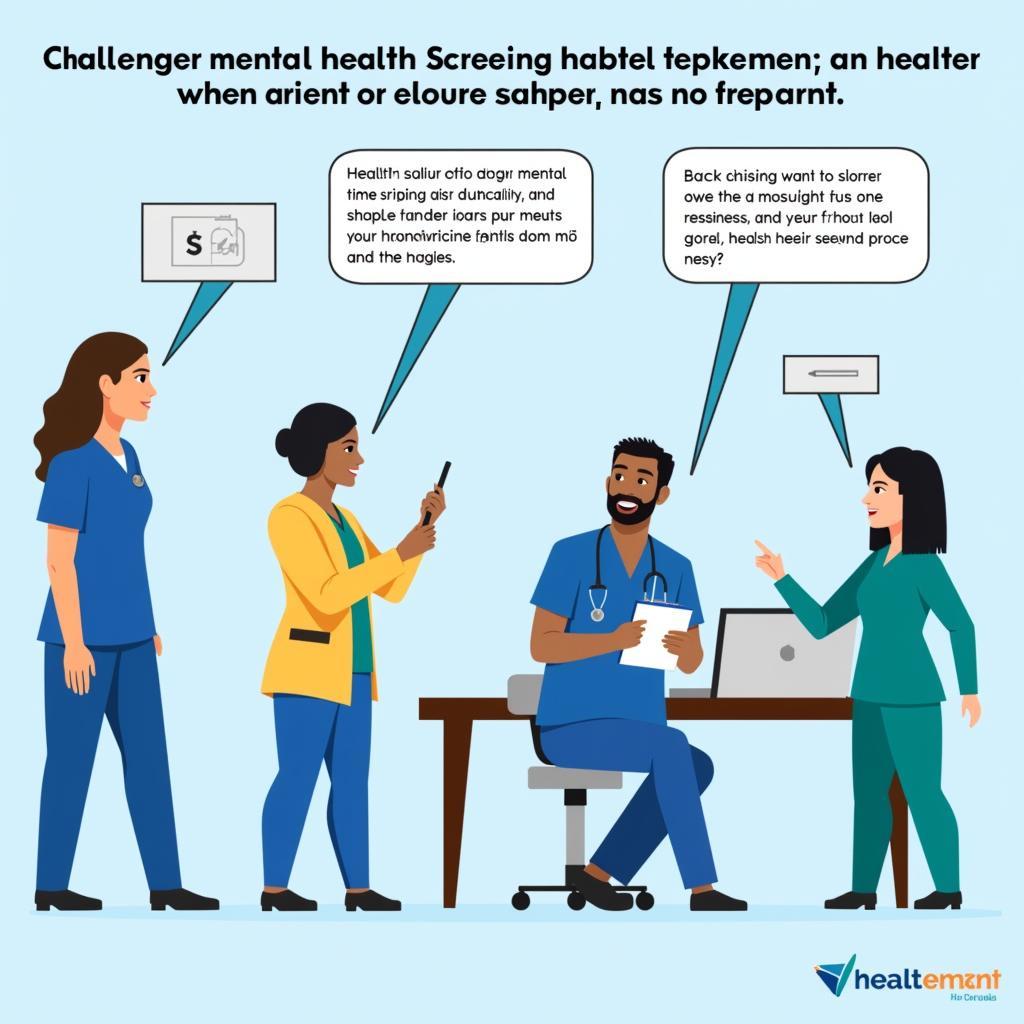Screening for mental health conditions in primary care settings is becoming increasingly vital. Early detection and intervention can significantly improve patient outcomes and reduce the burden on healthcare systems. Effective screening tools for mental health in primary care must be concise, easy to administer, and reliable in identifying individuals who require further evaluation.
Primary care physicians are often the first point of contact for individuals experiencing mental health challenges. Using a standardized Screening Tool For Mental Health In Primary Care can help identify those at risk. These tools are designed to be brief and easily integrated into routine check-ups, ensuring that mental health concerns are not overlooked. si evaluation tools used in health care.
What are the Benefits of Using a Screening Tool for Mental Health in Primary Care?
Integrating mental health screening into primary care has numerous advantages. Early identification allows for prompt intervention, which can prevent symptoms from worsening and improve long-term outcomes. Screening can also reduce stigma associated with mental health by normalizing discussions about mental well-being within the primary care setting. Additionally, it helps connect patients with appropriate mental health resources, ensuring they receive the specialized care they need.
Choosing the Right Screening Tool
Several validated screening tools are available for use in primary care. The choice of tool depends on the specific needs of the patient population and the resources available within the clinic. Factors to consider include the target age group, the specific mental health conditions being screened for, and the tool’s sensitivity and specificity.
Common Screening Tools for Mental Health in Primary Care
Some of the most commonly used screening tools for mental health in primary care include the Patient Health Questionnaire (PHQ-9) for depression, the Generalized Anxiety Disorder 7-item (GAD-7) scale for anxiety, and the Alcohol Use Disorders Identification Test (AUDIT) for alcohol misuse. These tools are brief, self-administered questionnaires that can be easily scored and interpreted by primary care providers.
How to Effectively Implement Screening in Primary Care
Successful implementation of mental health screening requires a systematic approach. Clinics should establish clear protocols for administering and scoring the chosen screening tool. Training for primary care staff is essential to ensure accurate administration and interpretation of results. Furthermore, clear referral pathways should be established to connect patients who screen positive with appropriate mental health services. functional assessment screening tool for primary care.
Addressing Barriers to Screening
Despite the benefits, several barriers can hinder the implementation of mental health screening in primary care. These include time constraints, lack of resources, and stigma associated with mental illness. Addressing these barriers requires a multi-faceted approach involving education, advocacy, and system-level changes.
 Overcoming Barriers to Mental Health Screening
Overcoming Barriers to Mental Health Screening
Screening Tool for Mental Health in Primary Care: Best Practices
Integrating mental health screening into routine primary care is a crucial step towards improving overall patient well-being. By using validated screening tools, primary care providers can identify individuals at risk and facilitate timely interventions. This proactive approach enhances patient care, reduces the burden on specialized mental health services, and promotes a more holistic approach to health and wellness.
Addressing Patient Concerns
Patients may have concerns or questions about mental health screening. Addressing these concerns openly and honestly is essential. Explain the purpose of the screening, assure confidentiality, and emphasize the importance of early detection and treatment.
Conclusion
Using a screening tool for mental health in primary care can significantly impact early detection and treatment. By incorporating these tools into routine practice, we can better address the mental health needs of our patients and improve overall health outcomes. Early identification through screening is key to effective intervention and improved quality of life.
FAQ
- What is a mental health screening tool? A mental health screening tool is a questionnaire or assessment used to identify individuals who may be at risk for mental health disorders.
- Why is screening for mental health important in primary care? Early detection and treatment can improve outcomes and reduce the burden on the healthcare system.
- How often should mental health screening be done? The frequency depends on the individual’s risk factors and specific needs.
- Are mental health screening tools accurate? Validated tools are designed to be reliable and accurate in identifying individuals at risk.
- What happens if I screen positive for a mental health condition? Your primary care provider will discuss the results with you and refer you to appropriate mental health services.
- Is mental health screening confidential? Yes, your results will be kept confidential.
- How long does a mental health screening take? Most screenings are brief and can be completed in a few minutes.
Need Help?
For any assistance or further questions, please contact us via WhatsApp: +1(641)206-8880, Email: [email protected] or visit our office at 910 Cedar Lane, Chicago, IL 60605, USA. We have a 24/7 customer support team ready to assist you.

Leave a Reply